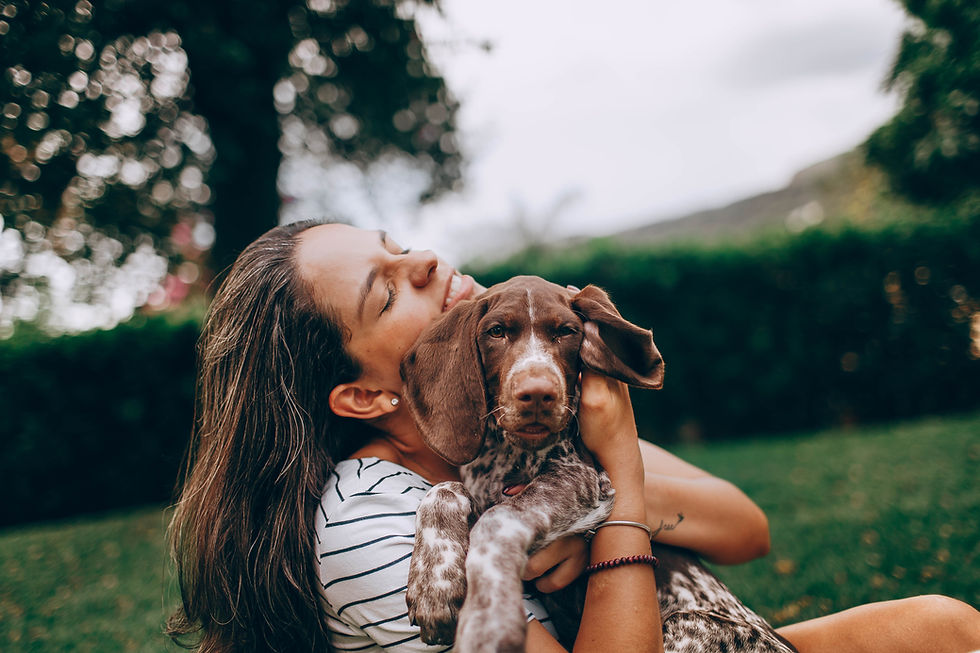Humanizing Our Dogs
- Renée at Bravo Dog

- Sep 18, 2025
- 4 min read
Updated: Sep 20, 2025
Are We Doing Dogs A Disservice?

When we think about our dogs, we often think about how similar they are to us. We share so much of our lives with them. Often times dog guardians are criticized for "humanizing" our dogs too much and treating them like babies. On one hand, if treating dogs like humans means we are treating them with kindness, consideration, compassion and empathy then I am completely on board! However, if we fail to recognize that dogs are a different species, with different needs, we could be missing the mark when it comes to their quality of life. This is what I intend to address in this article.
A Different Species Indeed
Canis lupus familiaris (dogs) are a domesticated subspecies of the gray wolf. Despite vast differences in appearance and size across various breeds, all domestic dogs share this same species classification. Dogs were the first species domesticated by humans, a process that began more than 14,000 years ago. It seems like common knowledge that yes, dogs are NOT human beings, however the lines can become blurred when we cohabit closely with another species, sharing everything from our bed to the brightest and darkest moments in our lives. Our dogs are there for us, we love them and we hope they love us too. We must think back in history; humans have been cohabitating with dogs for centuries so we may forget, dogs do have different needs that need to be addressed in order for them to live healthy and happy lives.
Body Language Differences
One of the KEY differences that humans can improve upon is reading dog body language. Many times I see a dog yawning in a specific context and the guardian has no idea that their dog is indeed stressed. Subtle body language signs like the whites of the eyes predominantly showing, lip licking or even ear positioning and facial tension can evade us and lead to putting dogs in situations we shouldn't. Co-existing with dogs more successfully means understanding dog body language (take our free mini course here!)
What Are Species Specific Needs?
Some of these points may appear to be obvious for many of us, however, sometimes we may need a reminder.
Note: dogs should NEVER have to earn these!

Nutrition
Dogs are omnivorous scavengers by nature, though they thrive on a primarily carnivorous diet. Their nutritional needs include:
Balanced diet with appropriate levels of protein, fat, carbohydrates, vitamins, and minerals.
Fresh, clean water available at all times.
Life stage-appropriate feeding, with variations for puppies, adults, seniors, pregnant/lactating females, and working/athletic dogs.
Weight; keeping our dogs at an optimal weight impacts longevity and well-being.
Avoiding harmful foods like chocolate, grapes, onions, and xylitol.

Exercise and Physical Activity
Dogs require regular physical activity to maintain their health and prevent behavioural problems:
Daily exercise suitable for the breed and individual energy levels (e.g., walks, playtime, agility).
Access to outdoor environments or secure areas where they can run, sniff, and explore.
Working breeds (e.g., Border Collies, German Shepherds) often need more mental and physical stimulation.

Social Needs
Dogs are highly social:
Human interaction is essential; they form strong bonds with their caregivers.
Many dogs also benefit from interaction with other dogs, though this varies by individual.
Prolonged isolation or lack of social engagement can lead to anxiety, depression, and destructive behaviours.

Behavioural and Mental Stimulation
Dogs have a high capacity for learning and problem-solving:
Training and enrichment activities (like puzzle toys, scent work, or trick training) are critical for mental well-being.
Dogs benefit from structure and predictability in daily routines.
Unmet mental needs often manifest as anxiety, boredom, vocalization, or destructive behaviour.

Rest and Sleep
Dogs need plenty of rest:
Adult dogs typically sleep 12–14 hours per day, while puppies and seniors may sleep even more.
They require a safe, quiet, and comfortable place to rest undisturbed.

Health and Veterinary Care
Regular veterinary check-ups, vaccinations, parasite prevention, and dental care are vital.
Many dogs need grooming appropriate to their coat type (e.g., brushing, bathing, nail trimming).
If you notice any behavioural changes, your first step should be ruling out pain with your vet

Safe and Stimulating Environment
Dogs thrive in environments that offer safety, comfort, predictability and sensory enrichment.
They need protection from extreme weather, secure fencing, and freedom from harmful substances (and not isolation)
Access to toys, chew items, and safe spaces (like crates or cozy beds) contributes to their well-being.

Freedom to Express Natural Behaviours
Dogs have innate behaviours that must be supported, not suppressed:
Chewing, digging, sniffing, chasing, and barking are natural behaviours that should be redirected appropriately—not punished.
Denying dogs the ability to express these instincts can lead to frustration and stress.

Individual Considerations
Breed traits significantly influence needs (e.g., brachycephalic breeds may need modified exercise, while herding breeds need more mental stimulation).
Life stage, health status, trauma history, and temperament all affect a dog’s specific care needs.
Every dog has their own preferences, likes and dislikes!
I hope this article outlines or reminds you how very different dogs are from humans despite our unique bonds and similarities.
.png)


